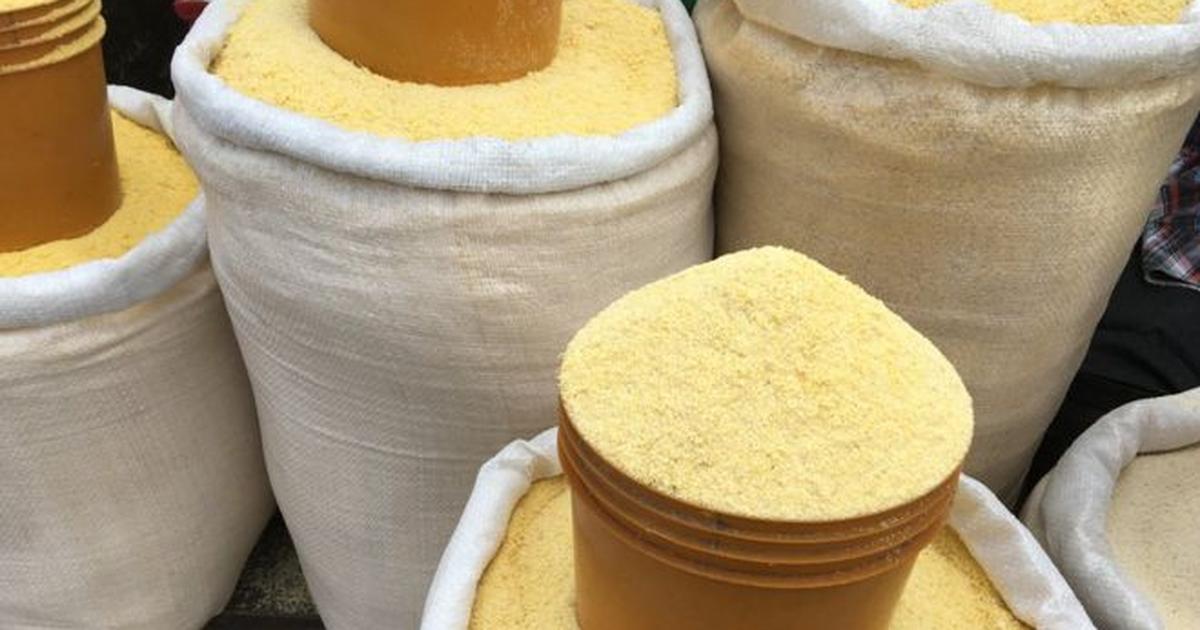Garri is a widely consumed staple food in Nigeria and other West African countries.
In Nigeria, Garri was known for its affordability, this led to many people tagging it a ‘poor man’s food”.
Many others, particularly those in the lower class have often hailed Garri as a ‘lifesaver”. Like when you ‘soak’ ‘Ijebu garri’ on a very hot afternoon with ‘a very cold’ water milk and sweetener.

Well, as it is often said, change is the only constant thing in life.
Fast forward to 2024, just about nine months into the administration of Bola Tinubu, Garri has joined the league of expensive food items.
Everything began after President Tinubu announced the removal of petrol subsidy in his inauguration speech.
Price Variability
Garri is experiencing price fluctuations influenced by various factors, including dollar rise.
Known for its versatility and importance in the diet of millions, garri’s price variability affects households across Nigeria.
The cost of a 50kg bag of garri is subject to several determinants.
These include location, transportation costs, and the type of garri, with Garri Bendel, garri Ijebu, white garri, and yellow garri being the most popular variants in the Nigerian market.
The shock on peoples faces when they go to the market and they hear the price of Garri, is depressing.
Some people even return home without buying it. This is the sad reality.
To avoid this embarrassing situation, it is advisable to confirm the prices of food items we want to buy before heading to the market.
Here is the price of garri in major cities in Nigeria as of first week of March.
Lagos: ₦1,400 to ₦1,600 per paint bucket
Abuja: ₦1,500 to ₦1,600 per paint bucket.
Port Harcourt: ₦1,500 to ₦1,600 per paint bucket.
Kano: ₦1,500 to ₦1,700 per paint bucket.
Ibadan: ₦1,300 to ₦1,500 per paint bucket.
Now we have successfully explored the prices of Garri in some major cities in Nigeria, it will be great to look at some of the factors that are affecting the price of Garri. Just so you know and channel aggression to the right causes.
Here Are Key Factors Affecting Garri Prices
Cassava Supply
As garri is derived from cassava, the availability and price of this root crop directly impact garri prices.
Fluctuations in cassava supply, due to factors such as crop yield and farming practices, can significantly affect garri’s market price.
Weather Conditions
Weather extremes, including droughts and excessive rainfall, can hinder cassava cultivation, leading to reduced supply and increased prices for garri.
Processing Costs
The process of transforming cassava into garri involves labour, energy, and equipment, all of which contribute to the final cost.
Any increase in these processing costs can lead to a rise in garri prices.
Transportation Costs
The logistics of moving garri from rural production sites to urban markets add to its price.
Variations in fuel prices and transportation costs can, therefore, result in price differences across regions.
Demand And Supply Dynamics
Seasonal demand surges, such as during festive periods, can push garri prices up, especially if production levels do not match the increased demand.
Exchange Rates Of Dollar, Other Currencies
The cost of imported machinery and inputs used in garri production can be influenced by exchange rate fluctuations, affecting the overall cost of production and, consequently, retail prices.
Storage And Preservation
Inadequate storage and preservation facilities can lead to post-harvest losses, reducing cassava availability for garri production and impacting prices.
Quality and Packaging
The market offers garri in various qualities and packaging options.
Also Read: Trouble as price of garri soars in Enugu major market
Premium quality or branded garri often comes at a higher price than its lower-quality counterparts.
Multiplier Effect Of Inflation Or Rising Cost Of Leaving
You see, whenever there is rise in cost of living, every commodity will increase in price. For instance, people who sell food items also spend part of their profit on purchasing things they need daily. As such, they mark up price to enable them still make profit and meet their daily need.
Unfortunately, Nigeria is presently experiencing all of the above factors.
For instance, there is increased expense on cost of production in most states, as manufacturers run personal electricity generators for more hours than periods they get supply from power companies.
Indeed, the state of electricity in most Nigerian states is abysmal.
That alone is a factor having its multiplier effect on the price of garri.





